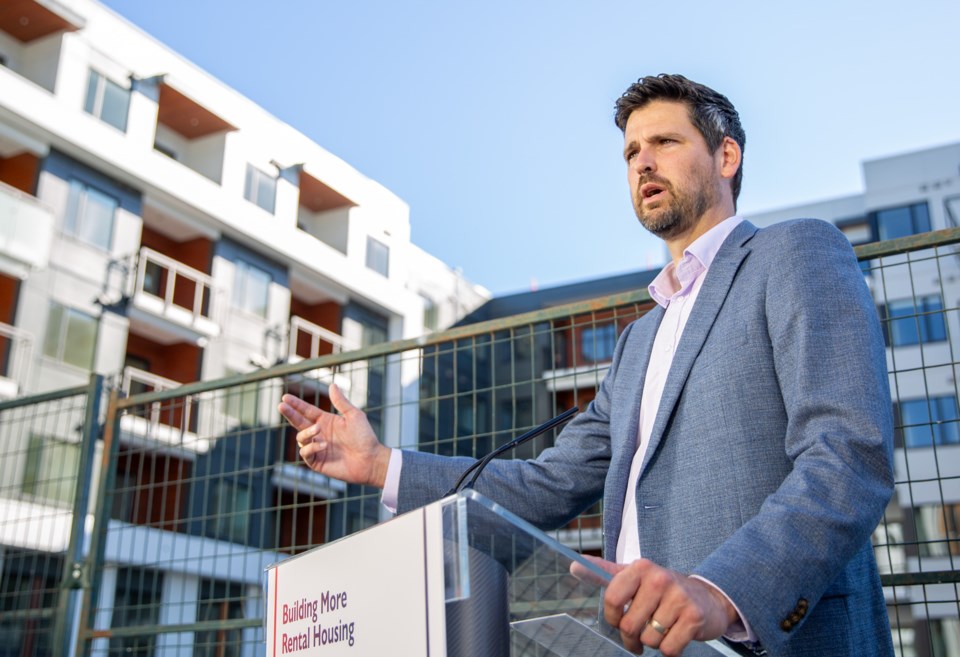He’s a tall, skinny lawyer shaking up the housing sector’s status quo with his ambitious reforms. No, not Premier David Eby — we’re talking about his federal doppelganger, Housing Minister Sean Fraser.
Fraser has been on a run of reforms since Prime Minister Justin Trudeau appointed him to the housing portfolio in July. He’s making waves nationally for bringing a sense of urgency to the file previously unseen at the national level.
Fraser’s track record so far has been impressive — withholding housing funds from municipalities that aren’t taking the proper steps to boost affordability (like Metro Vancouver), penalizing short-term rental operators to free up housing stock and reinstating pre-approved standardized housing designs to speed up construction times.
“We are living in a housing crisis,” Fraser said last week.
In British Columbia, though, the federal minister’s breakneck housing pace has earned a few chuckles from the New Democrat administration.
Federal observers don’t seem to notice that Fraser’s reforms largely copy those Eby already made several months ago. His public language is similar. The two even look alike. Both are lawyers. It’s like watching someone do an off-Broadway production of The David Eby Show.
Eby introduced legislation this spring and fall that took away powers from municipalities on housing, and threatened them with provincial intervention if they failed to allow more affordable housing construction, more quickly.
Fraser took a similar tack in October, withholding $115 million in federal housing accelerator funding from Metro Vancouver after it increased local development fees — only restoring the money last week when Metro agreed to annual reviews to ensure costs aren’t being passed down to buyers.
Eby announced sweeping changes to short-term rentals in October, effectively banning investment properties in urban areas from sites like Airbnb in order to free up more housing for sale and long-term rental.
Fewer than three weeks later, Fraser’s government announced a crackdown on short-term rentals as well, instructing the Canada Revenue Agency to refuse lucrative tax deductions in a bid to make the practice less profitable for investors.
Eby authorized in November the creation of standardized designs for townhouses and multiplexes, to speed up approval and construction of multiplex units on single family lots.
Last week, Fraser followed suit, saying Ottawa will resurrect a Second World War Canada Mortgage and Housing Corporation effort to have its own pre-approved design catalogue of homes to accelerate housing construction.
“We intend to take these lessons from our history books and bring them into the 21st century,” Fraser said.
There appear to be two main reasons Trudeau appointed Fraser to the housing portfolio with orders to get moving at warp speed.
The first is the truly awful polling numbers of the Trudeau government, which threaten to give an easy path to power for federal Conservative Leader Pierre Poilievre. Part of that public frustration is on housing, meaning the feds can no longer sit on their hands and complain publicly that housing is a provincial issue.
The second is an attempt to emulate the success Eby has had in aggressively tackling the issue. He’s faced widespread support for most of his reforms.
Many are, in fact, quite popular.
His government’s approval ratings are excellent. The Trudeau Liberals would like a little taste of that magic on the housing file, even if it means blatantly copying the BC NDP’s reforms.
The upside for the public on this is a federal and provincial government largely running in the same direction on housing, which could supercharge progress on improving affordability.
It’s likely to extend into 2024, when the Eby government unveils its “B.C. Builds” program, which is expected to be a multi-billion dollar effort in which the provincial government uses public land and money to partner with the private sector to build affordable homes earmarked exclusively for British Columbians. It may end up being the most ambitious public-sector housing construction plan in provincial history.
It’s highly possible Ottawa also follows suit in this area as well. Eby has been urging the feds to get back into the game of building federal housing, like they did decades ago. It’s not hard to imagine the Trudeau government, through Fraser, again drafting behind Eby on a big building initiative by mid-2024.
Federally, Fraser continues to look like the man who is rewriting the rules on housing at a breakneck pace. But B.C. still has the original deal here in Eby. He’e been doing the hard work digging up ideas and forging new ground, long before Ottawa decided to copy his successes.
Rob Shaw has spent more than 15 years covering B.C. politics, now reporting for CHEK News and writing for Glacier Media. He is the co-author of the national bestselling book A Matter of Confidence, host of the weekly podcast Political Capital, and a regular guest on CBC Radio. [email protected]





